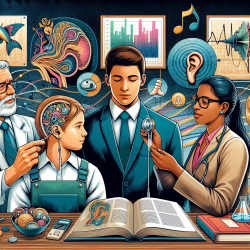The journey of aural rehabilitation for adult cochlear implant recipients is a multifaceted process, essential for maximizing the benefits of cochlear implants. The article "Ancillary Aural Rehabilitation Services for Adult Cochlear Implant Recipients: A Review and Analysis of the Literature" by Jean-Pierre Gagne provides a comprehensive review and critical analysis of the components and effectiveness of ancillary aural rehabilitation programs. This blog aims to highlight key findings from Gagne's research and suggest ways practitioners can enhance their rehabilitation skills or delve further into research.
Key Components of Aural Rehabilitation Programs
Aural rehabilitation programs for cochlear implant recipients typically encompass a range of services designed to improve speech perception, speech production, and overall communication abilities. These services may include informational counseling, personal adjustment counseling, speech perception training, communication strategy training, and training in the use of assistive devices, among others. Gagne's review underscores the importance of a comprehensive approach that addresses the specific needs of each individual.
Effectiveness of Aural Rehabilitation Programs
The review reveals a notable variability in the outcomes of ancillary aural rehabilitation programs, with some studies indicating positive effects on speech perception and personal adjustment, while others show minimal impact. This variability suggests that the effectiveness of rehabilitation programs may depend on a variety of factors, including the design and duration of the program, the competencies of the clinicians, and the motivation and pre-implant performance of the recipients.
Implications for Practitioners
- Practitioners should consider the individual needs and characteristics of each cochlear implant recipient when designing and implementing aural rehabilitation programs.
- Continuous professional development and training in the latest rehabilitation techniques and technologies are crucial for enhancing the effectiveness of rehabilitation services.
- Collaboration with other healthcare professionals and involvement in interdisciplinary teams can provide a more comprehensive and holistic approach to aural rehabilitation.
Directions for Further Research
Gagne's analysis highlights the need for more comprehensive and well-controlled studies to better understand the specific components and strategies that contribute to successful aural rehabilitation. Practitioners interested in research are encouraged to explore areas such as the long-term effects of rehabilitation programs, the impact of rehabilitation on quality of life and psychosocial well-being, and the cost-effectiveness of different rehabilitation approaches.
In conclusion, while the journey of aural rehabilitation for cochlear implant recipients is complex, the potential benefits are significant. By building on the insights from Gagne's review, practitioners can enhance their skills, contribute to the body of knowledge in the field, and ultimately improve the outcomes for cochlear implant recipients.
For those interested in exploring this topic further, the original research paper provides a wealth of information and can be accessed Ancillary Aural Rehabilitation Services for Adult Cochlear Implant Recipients: A Review and Analysis of the Literature.










